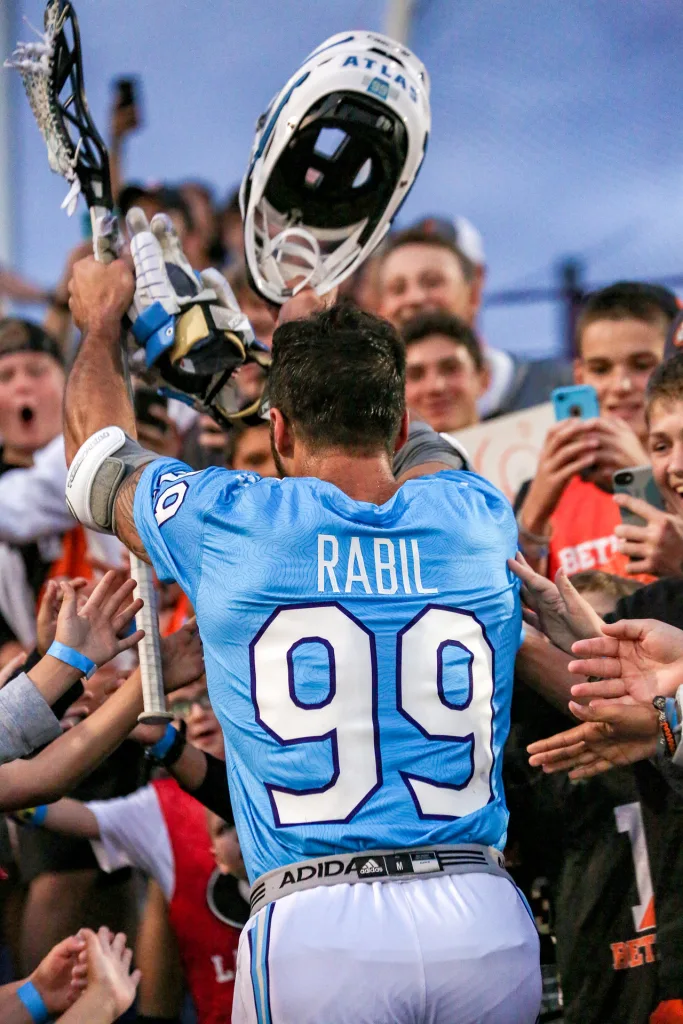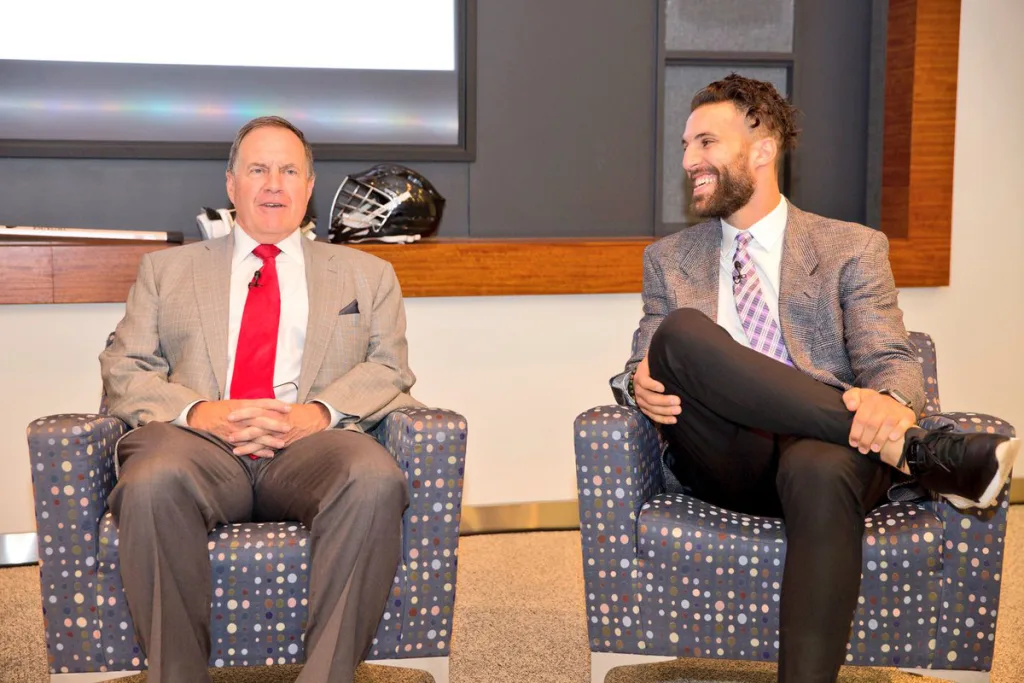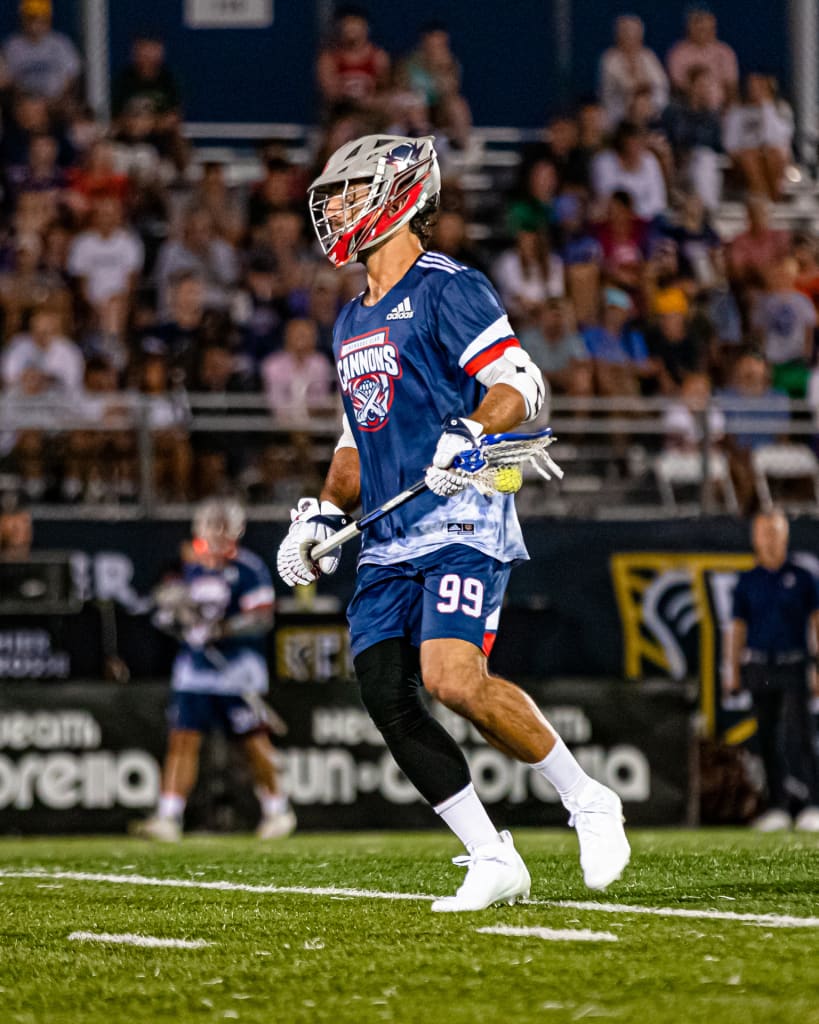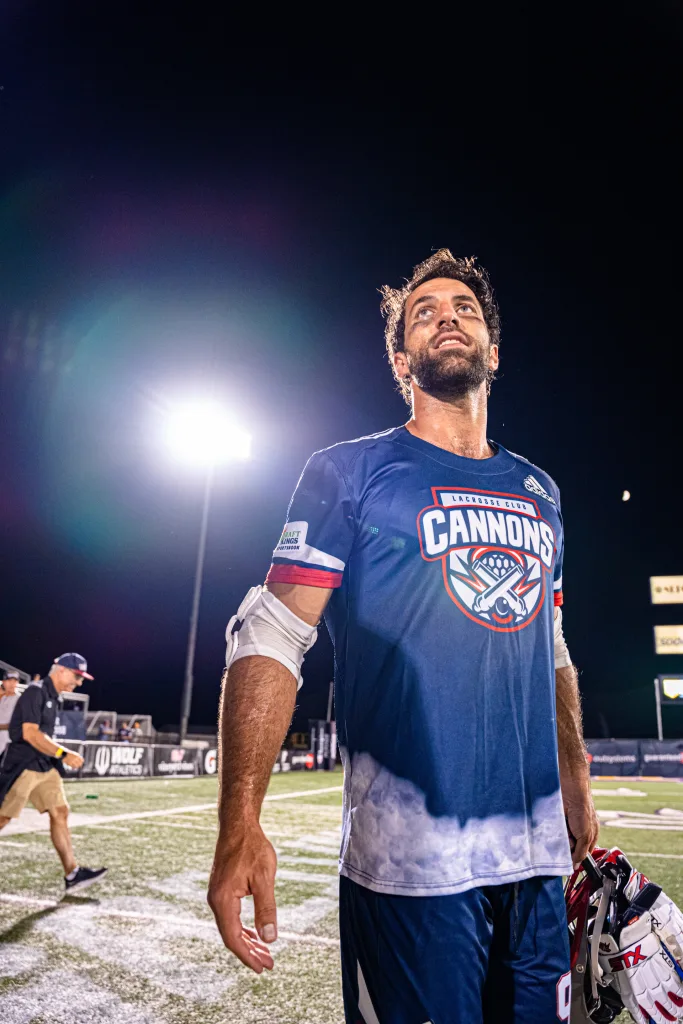With Paul Rabil, it’s tough to tell which came first, the athlete or the entrepreneur.
On one hand, you’ve got the former No. 1 overall pick who was a four-time All-American in college, a two-time MVP and three-time champion as a pro, and a two-time world champion with Team USA. He’s widely considered the greatest lacrosse player in history. On the other, he can easily trace his entrepreneurial spirit back to his childhood and his Lebanese roots. His grandparents came to America via Ellis Island—one started a clothing shop, the other a café. As kids in Gaithersburg, Maryland, he and his brother, Mike, shoveled driveways in the winter and pitched lemonade stands in the summer.
But while innovation has always been in his blood, it was his role as an athlete—and the sad state of professional lacrosse early in his career—that brought it to the fore.
“I was an entrepreneur by necessity,” says Rabil, whose rookie wage in Major League Lacrosse in 2008 was a paltry $6,000. In 2011, when he was league MVP and led his Boston Cannons to the MLL title, he was paid just $15,000. “I had to figure out how to support myself with additional income to supplement my dream of being a full-time professional lacrosse player,” he says. “And that meant learning the sponsorship business, building a media company, and starting a camp and clinic business.”
What he never expected, he says, was that he’d start a pro sports league.
The Premier Lacrosse League, which Rabil co-founded in 2018 alongside his brother, kicks off its sixth season next month. And so far, five seasons in, it’s well on its way to turning the Big Four professional leagues in America—the NFL, NBA, MLB, and NHL—into a Power Five.
The PLL has grown the lacrosse fan base from 15 million in 2019 to 45 million in 2023, according to the most recent MRI Simmons report. The 2023 season was the most-watched in league history with a 36% increase in average viewership on ABC, ESPN, and ESPN2 and a more than 60% increase on ESPN+. The league also saw a 157% increase in app downloads in 2023, along with a 20% increase in ticket revenue and a 68% increase in social media impressions, which totaled 674 million for the 2023 season alone.
Beyond the PLL, lacrosse has experienced international growth. According to Rabil, when he started playing, there were only 18 countries officially sanctioned by World Lacrosse, the sport’s governing body. Today, that number has risen to 91, and World Lacrosse aims to exceed 120 countries by 2028. Lacrosse will also return to the Olympics in 2028 for the first time in more than a century, largely thanks to Rabil’s evangelism and the innovation that has driven the PLL’s success.
So in just five years, Rabil has built one of the fastest-growing sports leagues in America, and in the process has helped turn what was once considered a regional sport for rich white kids into a global game.
Here’s a look at how he’s done it, some of the key decisions he’s made along the way, and what CEOs, innovators, and decision-makers everywhere can learn from it.
Don’t Just Build, Be a Solution
At the time the PLL launched, lacrosse was one of the fastest-growing sports among youth and high schoolers. Between 2003 and 2018, at the collegiate level, Division I lacrosse grew by 61 percent among men and a staggering 97 percent among women.
Still, MLL struggled to gain traction. Viewership and attendance were on the decline and players were frustrated with stagnant wages, poor playing conditions, low attendance, and limited exposure due to questionable media deals.
Rabil designed the PLL to solve each of these.
First, the league offered guaranteed minimum salaries of $25,000, as much as quadrupling some players’ wages, along with year-round healthcare. It was formed as a single-entity, venture capital-backed league and offered an equity stake for all players. In addition to exposure for players through the league’s national television broadcast deal with NBC, Rabil opted for a touring model rather than anchoring teams in home cities. Each game weekend, all teams descended upon a major city to play at a single venue—about a dozen over the course of a season. This roadshow or showcase format gave players a national platform while providing fans with unparalleled exposure to the sport during its critical incubation years.
These benefits helped lure nearly 160 of the world’s top players away from MLL.
“We wanted to change the profile of the athlete,” says Rabil. “We wanted to create an environment that mirrored the Big Four traditional sports leagues where, when we watch these phenomenal players in college, we know that’s only the beginning.”
Meet Your Audience and Fans Where They Are
Rabil considers himself “socially native.” Social media first launched while he was in college and officially hijacked the nation’s attention as he was starting his professional career in 2008. He says that today, he consumes storytelling across maybe half a dozen media. For younger fans, it’s likely more. Because lacrosse lacks coverage among traditional media, the PLL’s robust content house was designed to meet fans where they are, which is through live TV, social, podcasts, film, and even books.
“This coming year, we’ll do over two billion impressions, which means that people care more about professional lacrosse than they ever did,” says Rabil. “They’re sharing their favorite stories or moments or highlights, and they care enough to even comment and enter into discourse over what we are drumming up between our production house and our content distributors.”
The PLL’s multimedia approach starts with the product—the game itself. Sports is the original reality TV. It’s appointment TV in an otherwise on-demand world. So getting the on-field product right is paramount. Highlights anchor social media channels across the board. Players are given access to gameday highlights and stats for their own social channels to maximize reach, while original programming and docuseries bring players’ stories to life.
“You have to be everywhere, and be everywhere well,” says Rabil. “You don’t want to rush out a project that isn’t good. The story is king, as the creators of Pixar would often say. So you’ve got to get the story right. You’ve got to have the hook. You gotta have believable characters, you gotta have conflict, and you gotta have a resolution.”
With nearly one million followers across major social channels, the PLL’s brand of storytelling has become a reliable revenue stream, and in the process, has helped build a global lacrosse community.
Cultivate Tribalism to Build Community
Sports are inherently tribal. Team logos and colors, the cities to which they’re attached, and often the sport itself become key personality identifiers for fans.
“I think sport can appeal to some of our most primitive characteristics as humans,” says Rabil. “One, when you think about community, it’s tribalism. Two, on the field, it’s really a matter of survival and safety. And three, it really taps into fear, which all athletes and fans feel either about the threat of their team losing or getting eliminated from the playoffs.”
Leaning into tribalism, for the 2024 season, the PLL has assigned each of its eight teams to a home city, though it will maintain its touring system to target new fans in emerging markets.
The league not only encourages fan interaction in person at its games and online with its content programming. It has also created ways to reward its most ravenous supporters.

Last year, the league launched PLL Nation, a new fan experience that allows supporters to earn a fan status and unlock league rewards. Available in the PLL app, the platform lets fans build their status every time they show their support, earning exclusive league access and prizes along the way.
Initiatives like these have promoted community, which has been critical to the PLL’s growth. But when you’re competing with juggernauts like the NFL and other major sports leagues, rewarding fans in the app and winning their attention on social media isn’t enough. Cultivating true tribalism requires a grassroots approach, too—something that has been a foundation of Rabil’s approach since day one.
Word of Mouth Is Still King
On social, the PLL’s strategy is to meet fans where they are.
On the ground, it’s to create a new generation of lacrosse fans.
The PLL has multiple initiatives through which it achieves this. Through PLL Assist, the league works with 26 city-based programs from Harlem in New York City to Oakland, California, with the goals of growing the game, promoting diversity, and honoring the heritage of America’s oldest team sport, which dates back to the 1100s. Other efforts to grow the game in non-traditional markets include the Goals for Greatness initiative, through which Rabil has committed to putting two lacrosse goals in all 50 states each year, and Sticks in Hands, through which the PLL and its manufacturing partners provide lacrosse sticks to players who cannot afford them.
“I think with compounding interest over time, you’ll see more lacrosse goals like you see soccer posts and basketball hoops in neighborhoods around the country,” says Rabil. “It’s sort of understanding where the game has been, what its essence was formerly, and where we want to take it—all wrapped around how we’re building community.”
Rabil and the PLL team also studied Red Bull’s marketing tactics, specifically how they cultivate brand awareness and how they get Red Bull into people’s hands around the country through events, both their own and by partnering with those already established.
The result of that study was the creation of the PLL’s Shield Teams. With one in each of its clubs’ markets, Shield Teams are grassroots marketing machines that introduce fans to the local PLL team and the game itself, get sticks in people’s hands and goals on fields, and educate and engage fans to promote community and tribalism.
“Their job is to eat, drink, and sleep the Carolina Chaos or Boston Cannons or New York Atlas,” says Rabil. “And that means on-the-ground, hand-to-hand combat … really connecting with the fans and having a pulse on what they want.”
Plant Little Acorns
After his second season in Major League Lacrosse and winning his first MVP award, Rabil received a call from Bill Belichick. In a past life, Belichick was captain of his college lacrosse team at Wesleyan University in Connecticut. Now a multiple Super Bowl-winning head coach and general manager, Belichick knew talent when he saw it.
He saw it in Rabil.
“He was recruiting me to play for the Patriots,” Rabil recalls in his new book, The Way of the Champion, which releases this week. Rabil wanted to play wide receiver, but Belichick saw him as a defensive back. He bought shoulder pads and hired a trainer to begin working on a transition program. Then, it hit him: To pursue football, he’d have to give up lacrosse.

This was before the PLL. Before he was a world champion. Before he became lacrosse’s first million-dollar man.
His decision would change the trajectory of his life, and the sport of lacrosse.
“I decided that turning down the opportunity was actually the harder, braver path,” Rabil writes. “Making the decision to not play football meant that I was deciding to put everything into lacrosse. Even if it might cost me millions of dollars.”
Rabil believes that every choice you make can change the trajectory of your life. He remembers starting a Facebook page in 2008 and posting every day. Benign stuff like videos of practice drills or photos of his favorite pregame meals. As he performed well on the field, he received more media attention. His Facebook following swelled to more than 50,000. That enabled him to start his first lacrosse camp and clinic business. And though he didn’t know it at the time, starting that Facebook page would emerge as a crucial first step that eventually enabled him to start his own pro lacrosse league a decade later.
In 2020, the PLL and MLL officially merged, with the PLL absorbing its competitor and continuing operations as the marquee professional lacrosse league.

Ryan Holiday—a modern-day stoic philosopher, best-selling author, and friend of Rabil’s—says the merger calls to mind a book called The Fish That Ate the Whale.
“I just always loved that expression,” he said. “And I think that’s what’s interesting about Paul. I mean, you go and you play this game, and you’re the best there is, but you’re always smaller than the game. And the idea that he ends up starting his own league and then buying the remnants of the league that he once played in—I think there’s something poetic about that that’s really inspiring to me.”
And by Rabil’s logic, the PLL may have never existed if he hadn’t taken the small step of starting that Facebook page.
“Therein lies one of the profound lessons in life,” Rabil writes. “Most things of magnitude start small … Don’t wait for all the stars to align. Take your first shot. Plant your little acorn.”
Be of Service
When he looks back on his life and career, Rabil doesn’t talk about trophies or MVP awards. He talks of the pride and sense of community he feels when interacting with PLL players and fans. Having built the marquee professional league in his sport, having made being a pro lacrosse player a viable pursuit for future generations, and having grown the game globally, you could say Rabil has done arguably more for his sport than any GOAT-level athlete in history.
The Way of the Champion is his latest gift back to the lacrosse community, and it was Holiday who planted the initial acorn in the form of an email simply asking Rabil, “Why haven’t you done a book?”
“I’m just always really interested when someone has a chance to do the defining thing in a space,” says Holiday. “There are only a few people that are ever the sort of undisputed GOATs of their field, and most of them, in the world that we live in—they make so much money and they become so famous that they could never really write a book about what it takes to be great. Tom Brady’s not gonna write that book. LeBron James is never gonna write that book. Paul has already been the defining athlete in the space and the defining entrepreneur in the space. I thought it would be really cool for him to put down the stories and the lessons that define that space for the next generation.”

Rabil decided on a format that combines lessons from his personal experiences in sports, life, and business with lessons from the greatest athletes, entertainers, and entrepreneurs in the world. In it, he breaks the athlete’s journey into three parts: amateur, professional, and beyond the game.
“I’m currently living part three,” he says. “With everything we’ve built, I feel a sense of accomplishment that goes beyond what the younger version of myself even thought accomplishment was, which was largely based on championships or accolades. But I think the ultimate goal in life is to be of service. And that’s the feeling of accomplishment I have now, knowing that I’m giving back to something that took care of me.”
